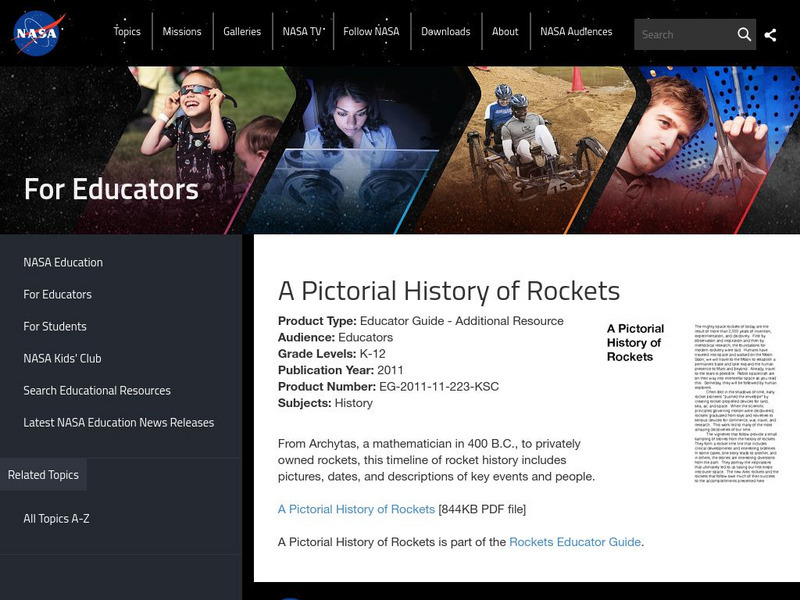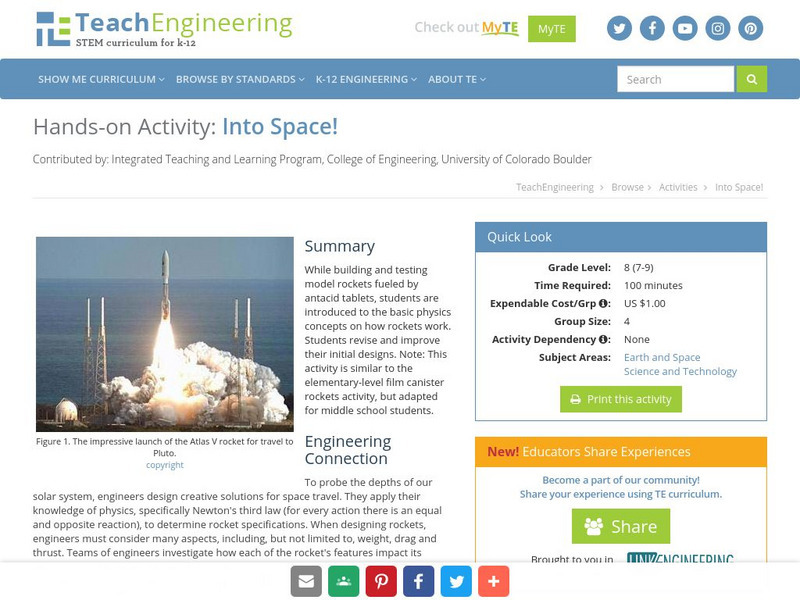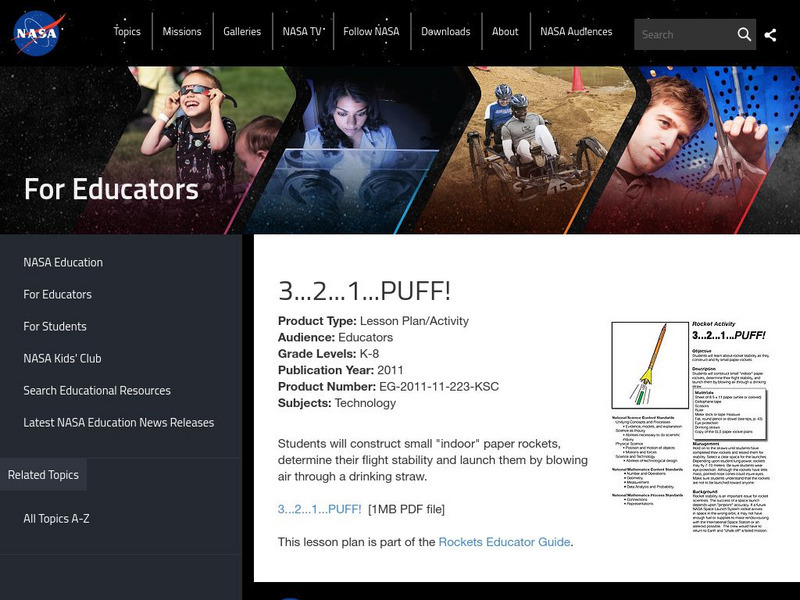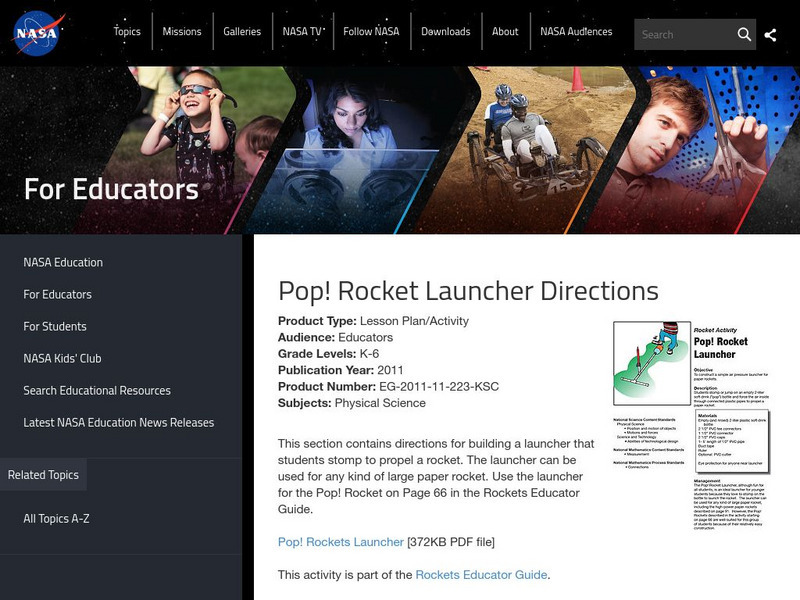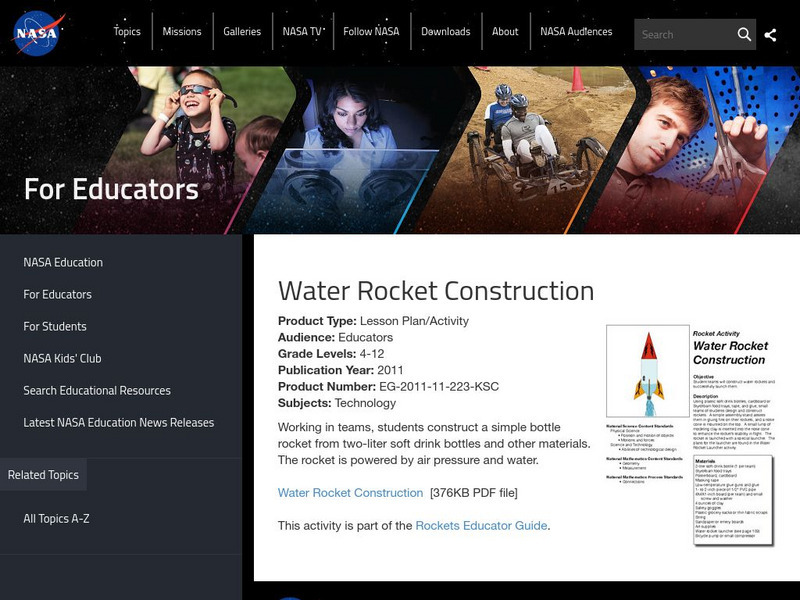Science Education Resource Center at Carleton College
Serc: Hydrogen Oxygen Rockets
Learners investigate how to build and launch a simple rocket that uses hydrogen and oxygen gases that will be mixed to propel the rocket. Students learn the principles of combustion reactions, kinetics, stoichiometry of reactions,...
Famous Scientists
Famous Scientists: Robert Goddard
Learn about the life and contributions of the father of modern rocketry, Robert Goddard, in this article.
BioEd Online
Bio Ed Online: Introduction to Force and Motion
How is the motion of an object affected by forces that act on that object? Can you predict how the motion of an object will be affected by balanced and unbalanced forces? Is there a relationship between force, mass, and acceleration? In...
Other
Florida International University: History of Rockets
A comprehensive site devoted to the history of rockets, with excellent illustrations interspersed throughout.
NASA
Nasa: Rockets Educator Guide: A Pictorial History
View pictures, descriptions, and dates of rockets throughout history. Learn about rockets and how they have evolved throughout time.
Science Buddies
Science Buddies: Model Rockets Aerodynamics: Stability
This science fair project for Science Buddies lets you be the rocket scientist. See how the rocket design changes its performance. The Science Buddies project ideas are set up consistently beginning with an abstract, objective, and...
Science Buddies
Science Buddies: Solid Motor Rocket Propulsion
What does it take to launch a satellite to explore Mars, or a mission to the moon? This project has several possible variations for exploring the physics of rockets. This is rocket science.
TryEngineering
Try Engineering: Blast Off
Hands on activity where learners focus on aerospace engineering to investigate space flight from the viewpoint of an engineer. They design, build, and launch their rocket, then share their experiences with the class.
TeachEngineering
Teach Engineering: Rocket Power
By making and testing simple balloon rockets, students acquire a basic understanding of Newton's third law of motion as it applies to rockets. Using balloons, string, straws and tape, they see how rockets are propelled by expelling...
TeachEngineering
Teach Engineering: Into Space!
While building and testing model rockets fueled by antacid tablets, students are introduced to the basic physics concepts on how rockets work. Students revise and improve their initial designs. Note: This activity is similar to the...
NASA
Nasa: Rockets Educator Guide: Rocket Races
This lesson allows students to create their own rockets using foam trays and drinking straws that are powered by a balloon. Students will race their rockets on a track and determine why some rockets moved faster than others.
South Carolina Educational Television
Etv: The Hobby Shop: The Rocket
Design your own virtual rocket, and then test launch it. Watch tutorials about Newton's laws of motion and rocket basics to help you improve your rocket's performance.
NASA
Nasa: Rockets Educator Guide: What Comes Next
Learn about NASA's plans for the next 50 years to replace the space shuttle. Discover how the new plan involves two new launch vehicles.
NASA
Nasa: Rockets Educator Guide: Pop Can "Hero Engine"
This lesson has students make water propelled engines using pop drink cans. Students will test the effectiveness of the engines and determine anything that affects the action.
NASA
Nasa: Rockets Educator Guide: 3, 2, 1, Puff!
This lesson gives directions for students to construct small, paper rockets that can be launched inside. The students will determine how stable the rocket is and launch them by blowing air through a straw.
NASA
Nasa: Rockets Educator Guide: Newton Car
This lesson gives students direction on how to experiment using gravity and force. Students will make a wooden car and use different forces to make the car propel.
NASA
Nasa: Rockets Educator Guide: Pop! Rocket Launcher
This lesson allows students to construct a rocket launcher that can be used for several different types of rockets. This rocket launcher is propelled by students stomping on a two liter bottle to provide force.
NASA
Nasa: Rockets Educator Guide: Pop! Rockets
This lesson plan allows students to make a rocket with card stock paper. Students will be able to launch the rocket and then discuss the variables affecting the height of each launch.
NASA
Nasa: Rockets Educator Guide: Foam Rocket
This lesson plan shows students how to construct a rocket using pipe insulating foam. Students will investigate the relationship between launch angle and range when launching their rockets powered by rubber bands.
NASA
Nasa: Rockets Educator Guide: Launch Altitude Tracker
This lesson plan allows student to make a launch altitude tracker. Student will use a sighting tube and angle measurements to track the altitude of rockets that are launched.
NASA
Nasa: Rockets Educator Guide: Rocket Wind Tunnel
This lesson's objective is to construct a rocket wind tunnel and have student predict the performance of their rocket. Students will use this rocket wind tunnel to measure and modify parts of the rocket to make it fly higher.
NASA
Nasa: Rockets Educator Guide: Water Rocket Launcher
Follow the directions in the lesson plan to construct a water rocket launcher made from off the shelf hardware and wood.
NASA
Nasa: Rockets Educator Guide: Water Rocket Construction
Students will follow steps to construct a rocket from a two-liter soft drink bottle and other materials. Students will use the water rocket launcher to launch this rocket.
NASA
Nasa: 3, 2, 1, Liftoff! Educator Guide
These activities introduce students to the International Space Station and how rockets were vital to its construction. The provided lessons correlate to all subject areas.
Other popular searches
- Model Rocketry
- Newton Rocketry
- Flight and Rocketry
- Advanced Rocketry
- Rocketry Experiments
- Rocketry Payload Experiments
- Model Rocketry Experiments
- Model Rocketry Electronics



